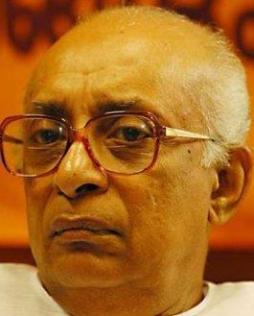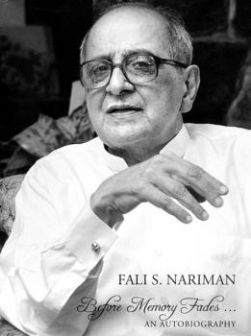Travelling for work is not taxing for Justice K T Thomas even at the age of 77 but on March 3, he felt it is not worth to embark on a 3,000 km journey from his hometown in Kerala’s Kottayam and waste several days in Delhi at government expense. In 377 words, the former Supreme Court judge summed up why he felt so and told V Narayanasamy, Minister of State in Prime Minister’s Office that he was withdrawing his consent to head the Lokpal Search Committee, which would recommend names to the Prime Minister-headed Selection panel for final appointment.
Thomas changed his mind within days as the 85-year-old eminent jurist Fali S Nariman, who on February 27 sent a terse letter, chose not to be part of the panel citing that the government restricting the panel’s mandate would result in the “most competent, the most independent and the most courageous” getting overlooked. The government wanted the Search panel of eight members to restrict their search to the names provided by the Department of Personnel and Training (DoPT) and could not consider any names. The old men, with a combined experience of 119 years in law either as an advocate or a judge, did not find this a prudent exercise and rocked the boat, putting a spanner in UPA government’s plans to appoint a Chairperson and members in the anti-corruption ombudsman ‘Lokpal’ before it terms end in May.
(Justice K T Thomas)
Controversies, delays and hiccups are not new for Lokpal, which became a reality after 51 years when then independent MP Dr L M Singhvi, father of Congress spokesperson Abhishek Singhvi, first mooted it. Prime Minister Jawaharlal Nehru had asked the senior Singhvi in jest, “to what zoo does this animal belong”, when he introduced the Scandinavian concept of ombudsman. History says Singhvi who indigenized the nomenclature to Lokpal on the insistence of Nehru.
After being signed into law on this New Year after nine aborted attempts in Parliament in 46 years, Lokpal appeared so near but the government faced opposition soon within a fortnight when it sought applications for being members in the ombudsman. Senior BJP leader Arun Jaitley shot off a letter to Prime Minister Manmohan Singh saying the DoPT cannot invite applications, as it was the prerogative of the Selection Committee to lay down the rules and procedures. Jaitley was of the view that the move was against the spirit of Lokpal Act. “The very idea of retiring or sitting judges of the highest court having to move applications for a post-retirement assignment is repugnant to the dignity of the office that they have held. Retired judges who lobby with the establishment with their CVs compromise their self-respect and dignity. A job-seeking judge may not be the best person to be appointed as a member of the Lokpal,” he wrote to the Prime Minister. Singh dismissed the criticism and said the advertisement was brought out to ensure that the ombudsman is established at the earliest. It was not the end but the beginning of another round of confrontation.
The second opportunity came soon at the time of selecting the fifth member, an eminent citizen, for Selection Committee. The four others are Prime Minister, Lok Sabha Speaker, Leader of Opposition in Lok Sabha and Chief Justice of India or his representative were to select the fifth member. Leader of Opposition Sushma Swaraj objected senior lawyer P P Rao’s name for the fifth position in the panel claiming that he was a “Congress loyalist”. She suggested several names like Nariman and Soli Sorabjee. She was said to be even agreeable to names like former Chief Justice M N Venkatachaliah and senior lawyer K K Venugopal. But Singh was adamant that only Rao could be considered and got the stamp on his appointment. BJP cried foul with Jaitley accusing Singh of damaging the institution of Lokpal even prior to its appointment.
(Fali S Nariman)
With fifth member of its choice in and brushing aside opposition to the process, government moved ahead to constitute a search panel following a recommendation from the Selection Committee and sent letters to eight members on February 21. In between, government also finalized rules and regulations for the implementation of Lokpal Act. Six days later, Nariman served the first volley saying the procedure was flawed. The government has said that the Search panel has to restrain themselves to the list provided by it and that it cannot alter the list by adding any name. In effect, it meant that the Search panel had to just prune the list provided by DoPT and forward to the Selection Committee. This seriously crippled the mandate of the Search panel and Thomas, after hearing about Nariman’s views, sought a copy of the rules to check whether the scope of the Search Committee has been curtailed.
Finding out that the panel has nothing much to do, Thomas wrote to Narayanasamy for the second time in a week’s time, “I wonder why there should be a Search Committee at all, much less, the arduous work to be undertaken by the members of such a Committee when the Selection Committee itself can decide on who should be the members of Lokpal.”
The government move was met with opposition from several quarters, including Aam Aadmi Party (AAP), which in its earlier avatar during Anna Hazare agitation has reignited the demand for Lokpal. AAP said the entire issue proves beyond doubt that the Congress-led UPA government is trying to appoint individuals convenient to it in a desperate bid to render the Lokpal as a weak and ineffective institution. Hazare’s close aide Kiran Bedi said the Lokpal Act is sound but it is not in clean hands. Congress, however, sought to downplay it saying, where is the question of government being embarrassed? Giving or not giving consent cannot be linked to government. These are private decisions. People can say yes or no for many reasons. How you can blame government for this?
What Swaraj or Jaitley could not do through a series of letters and interventions, Thomas and Nariman managed in just 557 words in two letters. They put a huge question mark on the manner in which the government was moving ahead with the appointment of members of the Lokpal. The Act may serve a noble cause but the government at least appears as half-hearted in realizing the goals and in between twisting the arms.
(An edited version appeared in ‘Spotlight’ of Deccan Herald on March 9, 2014)


